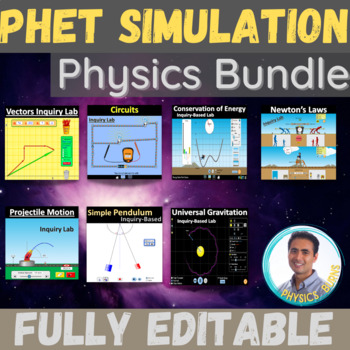Physics Phet Simulation Bundle (Inquiry Based)
Physics Burns
1.1k Followers
Grade Levels
6th - 12th, Higher Education, Homeschool
Subjects
Resource Type
Standards
NGSSHS-PS2-5
NGSSHS-PS2-2
NGSSHS-PS3-1
NGSSHS-PS2-1
NGSSHS-PS4-1
Formats Included
- Zip
Physics Burns
1.1k Followers

Includes Google Apps™
This bundle contains one or more resources with Google apps (e.g. docs, slides, etc.).
Products in this Bundle (10)
showing 1-5 of 10 products
Also included in
- Full High School Physics Lab Curriculum. Every lab is editable, so you can tweak things to fit your classroom perfectly. Each of these labs requires only basic materials.Here are all the labs that I do with my Regular, Honors, and AP Students. Each lab comes with worksheets that are differentiated dPrice $99.99Original Price $145.67Save $45.68
Description
These are 10 simple inquiry-based labs that I love to give students as an intro to different physics chapters. Students will figure out for themselves conceptual problems in different chapters. They will get the basic idea of the physical laws of each chapter while discovering mind-blowing concepts that can easily be discovered through a simulation. Everything is fully editable.
Students will:
- Learn through play
- Have guided questions to direct learning
- Discuss and Hypothesize
- Come up with Conclusions
- Be a part of real-world applications
Check out my Youtube Channel, Facebook Group, and Follow my Store :)
Total Pages
Answer Key
N/A
Teaching Duration
N/A
Last updated Oct 16th, 2021
Report this resource to TPT
Reported resources will be reviewed by our team. Report this resource to let us know if this resource violates TPT’s content guidelines.
Standards
to see state-specific standards (only available in the US).
NGSSHS-PS2-5
Plan and conduct an investigation to provide evidence that an electric current can produce a magnetic field and that a changing magnetic field can produce an electric current. Assessment is limited to designing and conducting investigations with provided materials and tools.
NGSSHS-PS2-2
Use mathematical representations to support the claim that the total momentum of a system of objects is conserved when there is no net force on the system. Emphasis is on the quantitative conservation of momentum in interactions and the qualitative meaning of this principle. Assessment is limited to systems of two macroscopic bodies moving in one dimension.
NGSSHS-PS3-1
Create a computational model to calculate the change in the energy of one component in a system when the change in energy of the other component(s) and energy flows in and out of the system are known. Emphasis is on explaining the meaning of mathematical expressions used in the model. Assessment is limited to basic algebraic expressions or computations; to systems of two or three components; and to thermal energy, kinetic energy, and/or the energies in gravitational, magnetic, or electric fields.
NGSSHS-PS2-1
Analyze data to support the claim that Newton’s second law of motion describes the mathematical relationship among the net force on a macroscopic object, its mass, and its acceleration. Assessment is limited to one-dimensional motion and to macroscopic objects moving at non-relativistic speeds. Examples of data could include tables or graphs of position or velocity as a function of time for objects subject to a net unbalanced force, such as a falling object, an object sliding down a ramp, or a moving object being pulled by a constant force.
NGSSHS-PS4-1
Use mathematical representations to support a claim regarding relationships among the frequency, wavelength, and speed of waves traveling in various media. Examples of data could include electromagnetic radiation traveling in a vacuum and glass, sound waves traveling through air and water, and seismic waves traveling through the earth. Assessment is limited to algebraic relationships and describing those relationships qualitatively.



